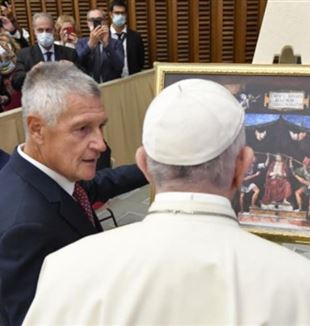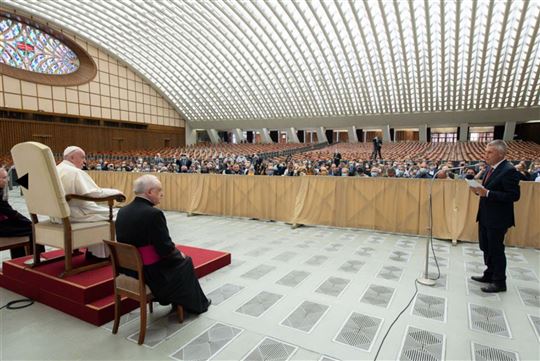
The Pope to the Pharmaceutical Bank: "Globalizing treatment"
200 volunteers from the foundation that organizes the Pharmaceutical Collection Day were received by Pope Francis. "The sharing of goods can improve our society and bear witness to that love in the neighbourliness that the Gospel requires of us.""Globalize treatment" instead of indifference. And expand "the possibility of access to those drugs that could save so many lives," such as the vaccine against Covid. "To do this takes a joint effort, a convergence that involves everyone. And you are the example of this joint effort.”
The "you" to whom Pope Francis spoke, this time, were the volunteers of the Italian Pharmaceutical Bank, received in audience on Saturday morning to celebrate the twentieth anniversary of the charitable organization. Two hundred people arrived from all over Italy and gathered in the Aula Nervi, among chairs placed at a safe distance and masks. Somehow, the vanguard of a reality that at the end of every winter, for the Pharmaceutical Collection Day, involves more than 20 thousand people, committed to receiving medicines from those who want to donate, which are handed over to 1,800 aid organizations for the poor. However, they are volunteers who also work hard all year round to respond to a form of poverty that is much less considered than hunger, but an equal burden for those who suffer. This is particularly true in these months of the pandemic, which have exploded the need for medicines just as less money began flowing and the lockdown slowed down aid. "We had to come up with a dozen new projects," Sergio Daniotti, president of the Foundation for three years, told the breakfast table in the morning. New alliances, unexplored paths, which allowed the collection of nearly 1, 200, 000 medicines in the first six months of 2020 alone, the equivalent of 15.6 million euros.
These are figures that were unimaginable when the Bank took off in 2000, a beginning that Daniotti recalled in his greeting to the Pontiff. He recalled the roots of the initiative, the idea of a group of young pharmacists, "spiritual sons of the Servant of God Luigi Giussani", who asked Compagnia delle Opere and Federfarma for help "to meet the needs of those who could not afford medicines". He also described the awareness that drives the Bank’s work: "The resources and money that pharmacies, companies and citizens give us are not for the poor, but of the poor.” He recalled that on the Day of collection "pharmacists and volunteers invite you to donate" and, together, "they perform a delicate task: those who enter the pharmacy, in fact, are often those who are suffering or are worried about their health or that of a loved one. It is an invitation addressed to someone who is suffering.” And he offered the Pope a wish: "To be able to offer the Bank’s help to a reality that you consider requires help.”
And the Pope responded with an intense speech, showing how close this issue is to his heart. He spoke of "pharmaceutical marginality", a problem which is often forgotten, but which means that "some people in the world do not have access to certain medicines, and this creates a further gap." He appealed to the need not to create further injustices, alongside those that already have emerged from an economy that is too often based upon waste: "If there is the possibility of curing a disease with a drug, it should be available to everyone. Too many people, too many children are still dying in the world because they are denied access to a drug that is available in other regions, or a vaccine.” And his quick reference to what might happen in the coming months, in which the remedy against Coronavirus and a pandemic which has taken more than a million victims is expected, became explicit shortly after when he insisted: "It would be sad if, in providing the vaccine, priority were given to the wealthiest, or if this vaccine became the property of this or that country, and was no longer for everyone. It must be universal, for all.” Evidently, it was not only an appeal towards volunteers or pharmacists. Francis also appealed to pharmaceutical companies. And to the rulers, "called upon to build a fairer world in which the poor are not abandoned or, worse still, discarded.” This is why Francis closed by thanking the volunteers "for your service to the weakest. Thank you for what you do. The Pharmaceutical Collection Day is an important example of how generosity and the sharing of goods can improve our society and bear witness to that love in the neighbourliness that the Gospel requires of us."
A heartfelt, earnest thanks, which accompanied him to the steps where he met Daniotti, who gave him a reproduction of Christ Crowned with Thorns by Bernardo Luini (the original, in the Pinacoteca Ambrosiana, was commissioned in 1522 by the Confraternita della Santa Corona, established by twelve noblemen who got together to provide medicine for the poor: a Banco ante litteram).
Francesco closed with a round of greetings, at a safe distance from the barriers, but close enough to bless a couple of children in the room and ensure his prayers to those who asked for a sick family member. "He asked to know their name, to pray," says Daniotti: "He has confirmed that he is a somewhat special person, unique. He has a converted heart that I do not have." And a gaze that makes him even more of a companion, after this meeting: "He spoke words that encourage us to continue. Our heart is the Collection Day, it is a founding gesture that we will never give up: an invitation to everyone to donate. But as a Bank, I believe that we also have a duty to remind society of the existence of this problem, and to involve others to address it. When you cooperate, you always get more than if everyone were only to do their own share.” A common effort, so that no one is discarded.
